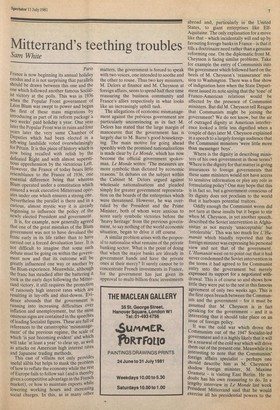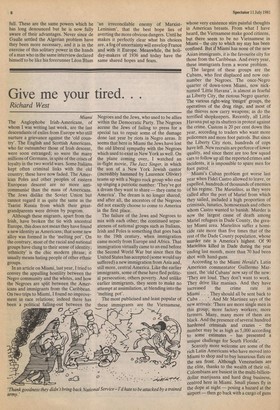Mitterrand's teething troubles
Sam While
Paris France is now beginning its annual holiday exodus and it is not surprising that parallels Should be drawn between this one and the one which followed another famous Socialist victory at the polls. This was in 1936 when the Popular Front government of Leon Blum was swept to power and began the first of these mass migrations by introducing as part of its reform package a two weeks' paid holiday a year. One year later the Popular Front was in ruins and four years later the very same Chamber of Deputies which had been elected in a left-wing landslide voted overwhelmingly for Petain. It is this piece of history which is now being recalled with relish by the defeated Right and with almost superstitious apprehension by the victorious Left. However, the France of today bears little resemblance to the France of 1936, one essential difference being that whereas Blum operated under a constitution which ensured a weak executive Mitterrand operates under one which ensures a strong one. Nevertheless the parallel is there and in a curious, almost mystic way it is already beginning to influence the policy of the newly elected President and government. It is, for example, now generally agreed that one of the great mistakes of the Blum government was not to have devalued the franc early in its life rather than to have carried out a forced devaluation later. It is not difficult to imagine that some such debate must be going on within the government now and that its outcome will be greatly influenced one way or another by the Blum experience. Meanwhile, although the franc has steadied after the battering it took in the early days following the Mitterrand victory, it still requires the protection of ruinously high interest rates which are resulting in lay-offs and shut-downs. Evidence abounds that the government is running into increasing difficulties over inflation and unemployment, but the most ominous signs are contained in the speeches of leading Socialist figures. These are full of references to the catastrophic 'mismanage ment' of the previous regime, the scale. of which 'is just becoming evident' and which will take 'at least a year' to clear up, as well as attacks on American high interest rates and Japanese trading methods. This cast of villains not only provides useful alibis but helps to mask the problem of how to reflate the economy while the rest of Europe fails to follow suit (and is thereby given a competitive advantage in the French market), or how to maintain exports while lowering working hours and increasing social charges. In this, as in many other matters, the government is forced to speak with two voices, one intended to soothe and the other to rouse. Thus two key ministers, M. Delors at finance and M. Cheysson at foreign affairs, seem to spend half their time reassuring the business community and France's allies respectively in what looks like an increasingly uphill task.
The allegations of economic mismanagement against the previous government are particularly unconvincing as in fact M. Delors has stated that the large margin of manoeuvre that the government has is largely due to M. Barre's good housekeeping. The main motive for going ahead speedily with the promised nationalisations is made clear by Le Monde, which has now become the official government spokesman. Le Monde writes: 'The measures are more symbolic than dictated by economic reasons.' In debates on the subject within the Cabinet M. Delors argued against wholesale nationalisations and pleaded simply for greater government representation on the boards of the enterprises which were threatened. However, he was overruled by the President and the Prime Minister, both of whom were anxious to score early symbolic victories before the 'heavy heritage' from the previous government, to say nothing of the world economic situation, began to drive it off course.
A similar problem arises with the proposal to nationalise what remains of the private banking sector. What is the point of doing that when the major banks are already in government hands and have the private ones at their mercy? It surely cannot be to concentrate French investments in France, for the government has just given its approval to multi-billion-franc investments abroad and, particularly in the United States, to giant enterprises like Elf Aquitaine. The only explanation for a move like that — which incidentally will end up by favouring foreign banks in France — is that it fills a doctrinaire need rather than a genuine reforming one. On the diplomatic front M. Cheysson is facing similar problems. Take for example the entry of Communists into the government which followed hard on the heels of M. Cheysson's 'reassurance' mis sion to Washington. There was a fine show of indignation here when the State Department issued its note saying that the 'tone' of Franco-American relations would be affected by the presence of Communist ministers. But did M. Cheysson tell Reagan that Communists might be joining the government? We do not know, but the air of outraged dignity at American interfer ence looked a little less dignified when a couple of days later M. Cheysson explained in a speech to a largely foreign audience that the Communist ministers 'were little more than messenger boys'.
Where is the dignity in describing ministers of his own government in those terms? Where is the dignity for that matter in giving assurances to foreign governments that these same ministers would not have access to sensitive information or play any role in formulating policy? One may hope that this is in fact so, but a.government conscious of its dignity does not proclaim to the world that it harbours potential traitors.
Oddly enough the Communist worm did not turn at these insults but it began to stir when M. Cheysson, in yet another speech, described the Soviet intervention in Afghanistan as not merely 'unacceptable' but 'intolerable'. This was too much for L'Humanite which blandly reported that the foreign minister was expressing his personal view and not that of the government. L'Humanite went on to point out that it had never condemned the Soviet intervention in the terms it had agreed to for Communist entry into the government but merely expressed its support for a negotiated withdrawal. This is of course so and shows how little they were put to the test in this famous agreement of only two weeks ago. This is the first open breach between the Communists and the government — for it must be assumed that M. Cheysson is in fact speaking for the government — and it is interesting that it should take place on an issue of foreign policy. It was the cold war which drove the Communists out of the 1947 Socialist-led government and it is highly likely that it will be a renewal of the cold war which will drive them out of the present one. Meanwhile it is interesting to note that the Communists' foreign affairs specialist — perhaps one Should describe him as M. Cheysson's shadow foreign minister, M. Maxime Grametz — is visiting East Berlin. He no doubt has his own reassuring to do. In a lengthy interview in Le Monde last week President Mitterrand said that he would exercise all his presidential powers to the full. These are the same powers which he has long denounced but he is now fully aware of their advantages. Never since de Gaulle settled the Algerian problem have they been more necessary, and it is in the exercise of this solitary power in the hands of a man who in the same interview declared himself to be like his forerunner Leon Blum 'an irreconcilable enemy of MarxistLeninism', that the best hope lies of averting the more obvious dangers. Until he makes it perfectly clear what his choices are, a fog of uncertainty will envelop France and with it Europe. Meanwhile, the holiday-makers of 1936 and today have the same shared hopes and fears.



































 Previous page
Previous page